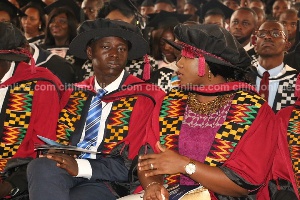 University of Ghana, like other public universities, depends heavily on its IGF to operate
University of Ghana, like other public universities, depends heavily on its IGF to operate
Professor Ebenezer Oduro Owusu, the Vice-Chancellor of the University of Ghana, has appealed to government to revisit the issue of financial clearance and allow public universities to retain 100 per cent of their Internally Generated Funds (IGF).
This, he said, would allow these institutions to operate at optimal levels and continue training the next generation of leaders for the nation.
“We have received notification that public universities are required to cede 34 per cent of their Internally Generated Funds (IGF) to government. University of Ghana, like other public universities, depends heavily on its IGF to operate, as government funding is woefully inadequate,” he said.
He said having to relinquish 34 per cent of IGF would put the University in a dire financial state and appealed that the issue be reviewed by government to ensure the smooth running of public tertiary institutions.
Prof. Owusu made the appeal on Friday during the Third Congregation of the College of Basic and Applied Sciences since the governance of the University of Ghana was restructured into colleges in August 2014.
He said 3,858 students were to graduate on Friday and Saturday at various levels from all the four Colleges in the University of Ghana. This is made up of 1,148 at the Postgraduate, 2,449 at the Bachelor, and 261 at the Diploma levels respectively.
Prof. Owusu congratulated the first batch of graduants who were from the College of Basic and Applied Sciences for undergoing four years of Graduate and Undergraduate programmes indicating that another set of ceremonies would be held in November this year.
He, however, said the continued lack of financial clearance for recruitment meant that the institution was severely constrained in the employment of faculty, administrators and other staff to replace those who left the University.
“For instance, allocation for Goods and Services for the tertiary education sub-sector ranges between one and two per cent of the sub-sector’s total budget, making it virtually impossible to carry out planned activities”.
Prof. Owusu said the situation was adversely affecting academic work as there was simply not enough staff to teach and provide the necessary support services.
He explained that because the University had not received clearance to employ new full-time staff, it spent a large chunk of its IGF in paying critical staff, whom the institution had taken on, to ensure that academic work was not negatively affected.
He, however, said he was happy with the news that councils for public universities would soon be inaugurated to ensure the progress of the institutions.
Prof. Oduro said the absence of such councils had meant that many decisions and initiatives had had to be placed on hold and, therefore, looked forward to working with members for the progress of the University.
Mr Kojo Botsio Aduhene, a renowned Businessman, who was the Guest Speaker, urged the graduands to consider the various degrees acquired as an initial capital for expansion and growth.
He made reference to some giant nations such as America and China who started very humbly but, with perseverance, had attained and maintained great achievements and advancements.
Mr Aduhene said to create wealth required humility, big dreams, building skills, boldness and taking risks, as well as perseverance, maintaining high levels of integrity and giving back to society what had been achieved without expecting a reward.
He, therefore, encouraged the graduands to go out and raise the bar of excellence.
The Deans of the various Schools which included Biological Sciences, Agriculture, Engineering Sciences, Physical and Mathematical Sciences, and Veterinary Medicine, presented the graduants for conferment.